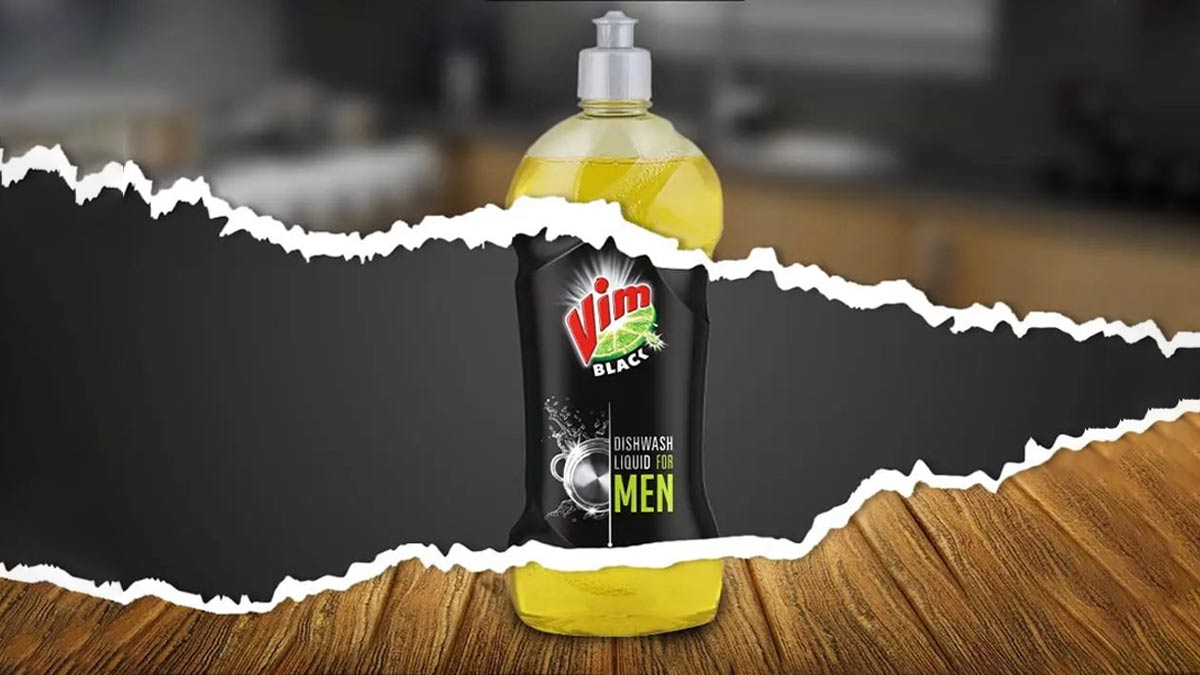After a weekend full of heated frenzy around the new ‘Vim Black for men’ advertorial, the brand clarified that it was a “joke.” But is this really a marketing gimmick we needed (or should be appreciating) in 2022?
Hindustan Lever recently ruffled a few feathers (or should we say, dishes?) when it launched a campaign for a new product called “Vim Black” meant only for men.
Here’s What The Product Page Looked Like

A black bottle in contrast to their usual transparent bottles filled with greenish-yellow dishwashing liquid, they branded it as “probably the world’s first ever dishwash liquid for men.”
Needless to say, the entire page reeked of misogyny and affirmed every bit of a stereotype, when it hailed men for doing the basic chore of washing dishes. They even created a product page for it on the official website, where the product was priced Rs.0 and it was also “sold out.” This one was for “men of all ages, sizes and personalities”. Yeah, throw in a pinch of inclusivity, sure, that makes it better.
After reading the full copy, I thought this was it, a poorly made ad campaign, aimed at being atrocious to grab eyeballs.
Milind Soman Promoting The Campaign
View this post on Instagram
Then came Milind Soman with a full fledged video ad campaign.
A little digging showed me an all-out campaign for the product, which is most evident from their instagram handle.
Needless to say, Twitter was soon up in arms, picking at every bit of what was wrong with the campaign. After women have spent so many years trying to move out of their patriarchy-enforced roles in the kitchen (and other places), this ad just seems absurd in every way for promoting another gender-biased product which encourages men to do the absolute bare minimum.
View this post on Instagram
Soon after, the brand clarified that it was indeed a “joke” and doing basic chores isn't quite something men should be seen bragging about. So, as it turns out, it was a fake product being marketed with pomp and show.
Is this the first time a fake product has been marketed? Not really. Recently, Bournvita came up with their campaign of “forced” packs for forced ideas, aimed at urging parents to not mould children into being what the little ones don’t want to be.
Decoding The Campaign

But coming back to the Vim campaign, let’s try to decode what the aim of it really was.
Was it to start a conversation around household chores and gender roles (Ranveer Singh breaking stereotypes)? Was it just to mock men? And most importantly, what would serve as the end goal of such a campaign, bringing around change?
From the outset, starting a conversation seems like the most apparent goal, and indeed, they did succeed on that front. However, because of the direct attack on men, the ad was mostly laughed at and joked about, rather than actually sparking a nuanced conversation of division of chores at home. It also conveniently swept all of the audience under one common domain, assuming uniformity of all “men”, made jibes at “six pack abs” and ended up becoming something people were more interested in mocking, rather than actually gaining anything insightful from.
Don't Miss: 6 Times Actors Were Trolled For Bizarre Reasons
It can be compared to the famous “share the load” campaign by Ariel which was heartwarming and thought provoking. This one left a lasting impression on those who watched it, and is more likely to create an impact, rather than a fake product which mocks men at large.
Then, the only thing this ad does is generate a buzz.
Don't Miss: Indian Businesswomen Who Made Headlines For All The Right Reasons
There’s a common saying which says “all publicity is good publicity”, but is it really? Many ads, songs, comments draw flak for being regressive, problematic and patriarchal, and there’s just a lingering sour aftertaste for them all through, rather than it evolving into anything that works in favour of the brand or the people. Cases in point being the Layer’r Shot Ad, the Zomato MC BC ad and others.
And ALL of this…for a product which doesn’t even exist. So does it directly impact sales of a product? I would guess not.
We’re in 2022. Back in 1993, many decades ago, Meghan Markle, former actress and now Duchess of Sussex, tore down a Proctor and Gamble advertisement which reduced women’s roles to belonging in the kitchen. That was when such ads were still even being made. Around 30 years later, are we really still debating whether household chores should be equal responsibility of both genders?

Take charge of your wellness journey—download the HerZindagi app for daily updates on fitness, beauty, and a healthy lifestyle!

Comments
All Comments (0)
Join the conversation